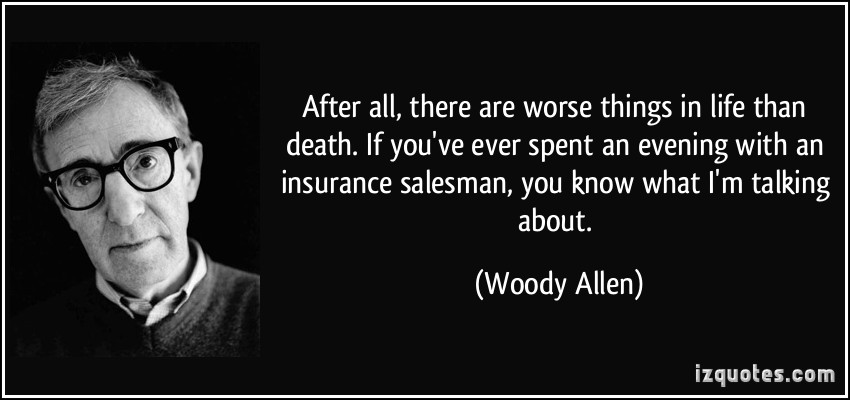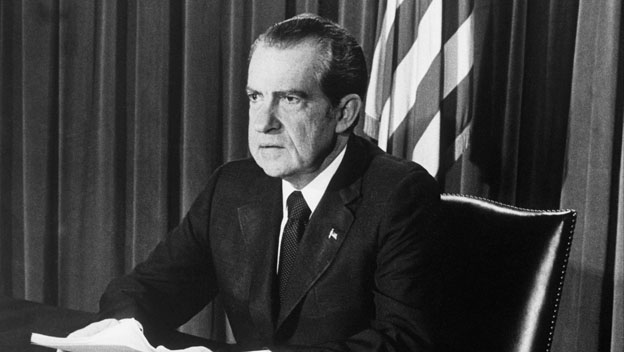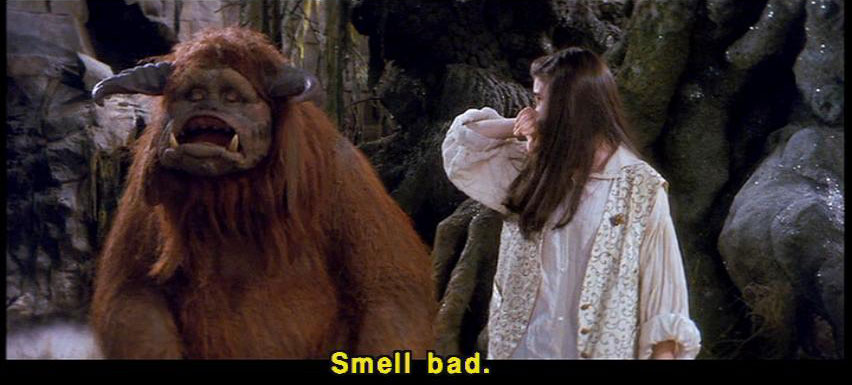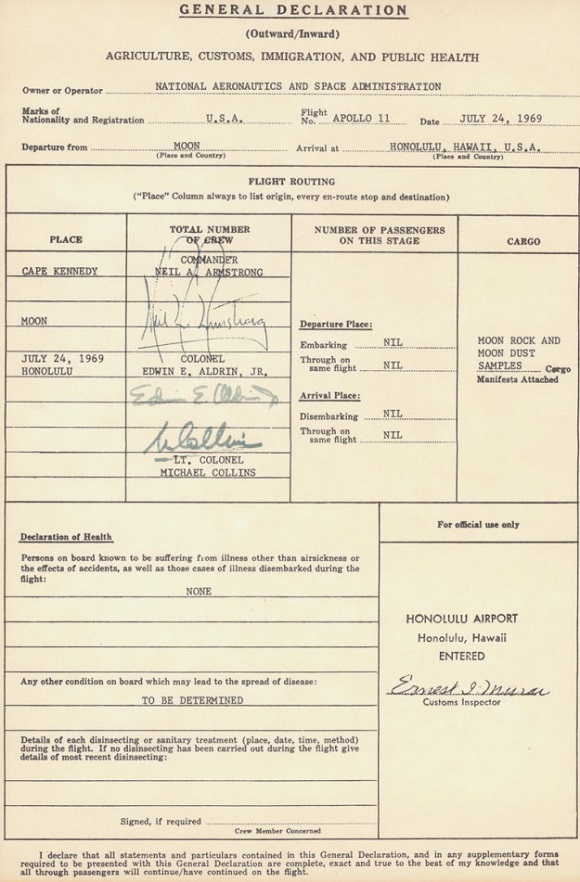November 14, 1969. Lightning strikes the mighty Saturn 5 rocket carrying the crew of Apollo 12 as it was steadily ascending into the Florida sky. Sixteen seconds later, proving an old saying wrong, a second bolt of lightning struck the spacecraft. Still, the mission was a success, and the Apollo 12 astronauts became the second group of people to land on the moon.
To commemorate the occasion, I’ve collected here a few tidbits on the moon landings. Enjoy!
Would you mind stepping behind the line, sir?
My favorite trivia is a mad tale of bureaucracy:
As the Apollo 11 team arrived safely on the Earth, the crew were brought to Hawaii. Despite being the three most famous men at the time, they were still asked to fill out a customs and declarations form at security.
In the section, “Any other condition on board which may lead to the spread of disease,” the answer is a chilling, “To be determined.”
And in the section asking “Departure From:” the Apollo 11 crew wrote “The Moon”. Try to beat that…
Insurance anyone?
 Neil Armstrong, Michael Collins and Buzz Aldrin couldn’t afford the life insurance policy for an astronaut. So, all three astronauts of the Apollo 11 mission decided to create a plan of their own to support their families if something bad were to happen.
Neil Armstrong, Michael Collins and Buzz Aldrin couldn’t afford the life insurance policy for an astronaut. So, all three astronauts of the Apollo 11 mission decided to create a plan of their own to support their families if something bad were to happen.
In July 1969, while they were in pre-launch quarantine, they signed hundred of autographs and sent them to a friend. If anything was to happen to them, the entrusted friend was to send the autographed memorabilia to each of the astronaut’s families. This way they could make some money by selling the signatures.
Mourn, Mother Earth
 Should things go wrong, the astronauts’ families would be busy selling autographs, and President Nixon would give this haunting speech. I always get goosebumps when I read it:
Should things go wrong, the astronauts’ families would be busy selling autographs, and President Nixon would give this haunting speech. I always get goosebumps when I read it:
“Fate has ordained that the men who went to the moon to explore in peace will stay on the moon to rest in peace.
These brave men, Neil Armstrong and Edwin Aldrin, know that there is no hope for their recovery. But they also know that there is hope for mankind in their sacrifice. These two men are laying down their lives in mankind’s most noble goal: the search for truth and understanding. They will be mourned by their families and friends; they will be mourned by their nation; they will be mourned by the people of the world; they will be mourned by a Mother Earth that dared send two of her sons into the unknown.
In their exploration, they stirred the people of the world to feel as one; in their sacrifice, they bind more tightly the brotherhood of man. In ancient days, men looked at stars and saw their heroes in the constellations. In modern times, we do much the same, but our heroes are epic men of flesh and blood.
Others will follow, and surely find their way home. Man’s search will not be denied. But these men were the first, and they will remain the foremost in our hearts. For every human being who looks up at the moon in the nights to come will know that there is some corner of another world that is forever mankind.”
What is that smell?
During the Apollo 11 mission, the solution to, erm, waste disposal hadn’t really been solved yet, and one astronaut in particular spent the entire mission on tablets that stop diarrhoea just to combat the problem.
As Michael Collins later said, “The drinking water was laced with hydrogen bubbles’ which produced “gross flatulence…resulting in a not so subtle and pervasive aroma which reminds me of a mixture of wet dog and marsh grass.”
 Mercifully, other smells weren’t so bad. One thing that surprised the astronauts was the strong odor of the lunar dust. While conducting experiments on the surface of the Moon, their spacesuits gathered moon dust in the creases of the suit. Once they returned to the Lunar Module and removed their helmets, the dust got everywhere (some astronauts even tasted it). After coming into contact with oxygen for the first time inside the Lunar Module, the four billion years old moon dust produced a pungent smell they compared to gun powder. More poetically, Neil Armstrong described the scent as similar to wet ashes in a fireplace. This distinct smell remains a mystery, as moon dust and gun powder have no similar compounds. The exact explanation remains unknown.
Mercifully, other smells weren’t so bad. One thing that surprised the astronauts was the strong odor of the lunar dust. While conducting experiments on the surface of the Moon, their spacesuits gathered moon dust in the creases of the suit. Once they returned to the Lunar Module and removed their helmets, the dust got everywhere (some astronauts even tasted it). After coming into contact with oxygen for the first time inside the Lunar Module, the four billion years old moon dust produced a pungent smell they compared to gun powder. More poetically, Neil Armstrong described the scent as similar to wet ashes in a fireplace. This distinct smell remains a mystery, as moon dust and gun powder have no similar compounds. The exact explanation remains unknown.
Holy Communion
Since the Moon Landing was a global event, everyone would be watching. That’s why NASA asked the astronauts on Apollo 11 not to engage in any religious activities. However, Buzz Aldrin felt the opportunity was too great to let pass by. Once Armstrong and Aldrin landed safely on the Moon and were waiting to take their first steps, Aldrin radioed back to Earth asking anyone who was listening to reflect on that moment in history. Aldrin then produced a small flask of wine and a piece of bread, which he then consumed whilst reading from the Gospel of John. From that moment Buzz Aldrin then became the first and so far the only person to participate in the Christian ritual of Communion on the Moon.
Source: 11 Strange Facts You Didn’t Know About the First Moon Landing and Apollo 12: 1969’s Other Moon Landing.






mind boggling facts 🙂
Couldn’t agree more! Thank you and welcome 🙂
Very interesting facts. It is the first time I’ve heard of any of these.
Me too! That’s why I had to share 🙂
Very interesting, Nick. Didnt know any of this.
Humanity at its best 🙂
I can’t even imagine going to the moon thinking I might not be able to get back. Such interesting material. Thanks for sharing, Nicholas. 🙂 — Suzanne J.
A pleasure! Yes, it’s rather scary 🙂
Fun facts, Nicholas! Thanks for sharing. 🙂
A pleasure. Thanks for reading 🙂
🙂
Fascinating, Nicholas! Thanks. I knew campfire ashes were special.
Lol – absolutely 😀
Fascinating. Great work. Thanks for sharing this info on such a historic moment in our history.
Thanks for reading!
My feelings exactly 🙂
Wow. You really rocked the anniversary!
Yay! Thanks 🙂
Loved this post, Nicholas. I hadn’t heard any of this trivia before. It’s fascinating. I can’t believe they had to fill out customs forms. Red tape at its best!
Lol – I know, right?? Even in space, there’s no escaping bureaucrats 😀
Awesome post, Nicholas, and so beautifully written. This line in particular sent goose bumps up my arms: “They will be mourned by their families and friends; they will be mourned by their nation; they will be mourned by the people of the world; they will be mourned by a Mother Earth that dared send two of her sons into the unknown.” Really, really good.
I know, I had chills myself reading that. Powerful stuff. If you consider what they used to go to the moon and back, it’s a small miracle that Nixon never had to give that speech.
Loved this Nicholas. I remember the first trip well. When you think of the technology that exists today compared to then it boggles the mind that the mission was a success.
I know. It’s like they flew up there and back again using a band aid, a rubber band and a couple of tin boxes. Oh, and dynamite. Lots of dynamite.
🙂
That’s a very ingenious plan with the autographs. What did they do with them after they got back?
I wonder if should have a look at ebay 🙂
Would not be surprised to find some there.
Fascinating stuff. Had to save to Flipboard so I could refer to it in future.
Yay! Thanks for that 🙂
I always remember thinking, ‘Is this it?’ I was nearly eighteen, and thought it was a tremendous anti-climax. When I later saw the film ‘Capricorn One’ I was convinced that story was closer to the truth…
As I got older, I stopped caring either way. For a sci-fi writer like you, it must be the ultimate event, I suppose.
Best wishes, Pete.
You understand me well 🙂
Some really interesting facts – I remember my family and I sitting around the telly watching as Neil Armstrong and Buzz Aldrin became the first men to walk on the moon. I was seven years old and I remember thinking how lucky they were to walk on the moon – I thought it was amazing 😀
One of humanity’s finest moments, if you ask me 🙂